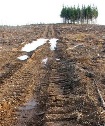 Dakatcha is located in southeastern Kenya and it hosts tropical dry forests, grasslands and farmlands. The region is rich of biodiversity, and it represent a corridor for elephant. Besides the Golden-rumped Elephant Shrew, in the area live 11 other endangered species live in the forest area. In addition, the Dakatcha forest home to many rare bird species. For this reason, Dakatcha was declared in 2001as "Important Bird Area".
Dakatcha is located in southeastern Kenya and it hosts tropical dry forests, grasslands and farmlands. The region is rich of biodiversity, and it represent a corridor for elephant. Besides the Golden-rumped Elephant Shrew, in the area live 11 other endangered species live in the forest area. In addition, the Dakatcha forest home to many rare bird species. For this reason, Dakatcha was declared in 2001as "Important Bird Area".
Dakatcha is also home to more than 20,000 indigenous peasants of the Watha and Giriama tribes. For centuries, is the cultivation of cassava and maize, their livelihoods. The planned jatropha plantation provides few jobs. For the farmers it is not economic. On the contrary, the plantation displacing the regional food production and had the expulsion of small farmers from their ancestral lands to follow.
An Italian company has asked the authorities for permission to lease 50,000 hectares there to grow jatropha, whose seeds are rich in oil that can be turned into bio-diesel.
This plant, originally from South America, has long been grown in Africa as a hedge to keep out animals - goats stay well away as it is poisonous. The area affected is community land which ias being held in trust by the local council.
Kenya Jatropha Energy Ltd is 100%-owned by the Milan-based Nuove Iniziative Industriali SRL.
"Land is very important to us. We farm and get our livelihood from it. On this land we bury our dead." said a villager to the BBC. "Our future is no longer in our hands. We have been told we have to move because they want to plant jatropha here," said 27-year-old Merciline Koi, a mother of two, who added that there had been no offer of compensation for leaving her home in Dakatcha Woodlands.
Some ask "Why 'feed' a car in Europe when hunger at home is still a reality?"
ActionAid and the Royal Society for the Protection of Birds (RSPB) commissioned a report to investigate just how green the jatropha project in Kenya's Dakatcha woodlands would be. The study by the consultancy group North Energy found that jatropha would emit between 2.5 and six times more greenhouse gases when compared to fossil fuels. This is partly because large amounts of carbon are stored in the woodlands' vegetation and soil but the plantation would mean clearing the land of this vegetation.
Nuove Iniziative Industriali claims to have an agreement with Ikea, but the company said to the BBC it will not source jatropha oil from Kenya until it can be sure that this will not contribute to the conversion of natural habitats.
"This switch from fossil fuels to renewable energy must never be at the expense of people or the environment," Ikea told the BBC in a statement.
Retet den Regenwald call in a petition to stop the plans for the Jatropha plantation.
|
To |



